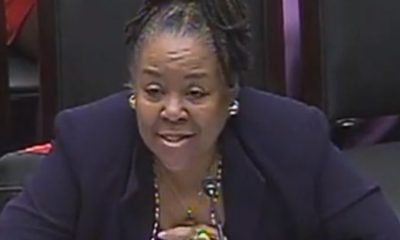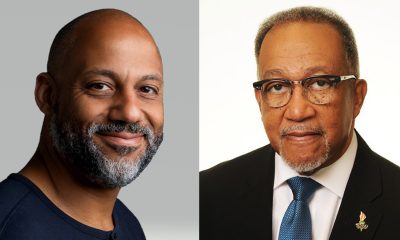Economics
OP-ED: Shrinking middle class squeezes African Americans, Latinos
They teach our children, drive our buses, clean our streets and deliver our mail. They staff the government and make it run. Their public-sector jobs are at the heart of the middle class, particularly for African-Americans and Latinos. And they are in steep decline.
One of five African-American adults works in government employment. This is a higher percentage than either white Americans or Latinos. It isn’t surprising. Freed of segregation, African-Americans came into our cities just as manufacturing jobs — the traditional pathway to the middle class — were headed abroad. Government employment offered secure jobs, decent pay and benefits, a chance to buy a home and lift your family.
Women also flocked to public service jobs, which offered greater professional and managerial opportunities.
But in 2008 when the economy collapsed, state budgets were savaged. Tax revenues plummeted; spending needs soared. Deep cutbacks in regular programs followed. No one will be surprised to learn that African Americans lost jobs at a higher rate than whites, often because of seniority.
Now, in the sixth year of the recovery, the economy has inched back, unemployment is down. But employment in the public sector hasn’t bounced back. The new jobs being created pay less and offer less security than the jobs that were lost.
And this has devastating effects on the African-American middle class, the very people who have worked hard, played by the rules, and sought to get ahead.
The Economic Policy Institute estimates that since 2007, there are 1.8 million missing jobs in the public sector. Moreover, across the country, conservative Republican governors have assaulted unions and sought to curb collective bargaining, erase teacher tenure, and dramatically cut pensions and other benefits.
The loss of jobs and cutback on wages exacerbated the housing collapse. We’ve learned that banks and other predators targeted black neighborhoods like Prince Georges County in Maryland.
They marketed shoddy mortgages, leaving those with good credit paying higher rates than they could have and those with no credit betting it all on the assumption that housing prices would never fall.
Many report on the decline of the middle class, which has fallen backward over the last decade in both median income and wealth. More than 8 of 10 Americans, according to a Pew Poll, now report that it is harder to maintain their standard of living than it was 10 years ago.
And African-Americans and Latinos got hit the hardest. The race gap has widened, not narrowed, in this century. The New York Times reports that 50 percent of African-Americans now are low-income households, along with 43 percent of Latinos — a category that has been growing since 2000.
In Illinois, the nonprofit Corporation for Enterprise Development reports that more than one in three households suffers a “persistent state of financial insecurity.” Again, African-Americans, Latinos and single women with children fare worse.
Numbers like this numb. We know the reality. But we seem in denial. When Baltimore blows up, the spotlight is put on the police and their practices, as it should be.
But police forces across the country are ordered to keep order in communities racked with unemployment, homelessness, drugs, guns, collapsing schools, impoverished families and crushed hopes. The best-trained, more empathetic police officers in the country would have a hard time fulfilling that mission.
This country cannot stay in denial. We have to have a bold plan to rebuild high poverty neighborhoods from Chicago’s South Side to Appalachia’s valleys. Across the country we have work to do — from rebuilding 100-year-old water systems to creating the rapid transit that will connect people to jobs to moving to clean energy — and we have an entire generation of young people desperate for work.
We have corporations stashing trillions abroad to avoid paying their fair share of taxes. Billionaire hedge fund operators pay a lower tax rate than their secretaries. We need rebuild America and put people to work. The cost of losing another generation to despair will be far greater than the cost of investing in them on the front side of life.
Activism
Oakland Post: Week of April 24 – 30, 2024
The printed Weekly Edition of the Oakland Post: Week of April 24 – 30, 2024

To enlarge your view of this issue, use the slider, magnifying glass icon or full page icon in the lower right corner of the browser window. ![]()
Business
Black Business Summit Focuses on Equity, Access and Data
The California African American Chamber of Commerce hosted its second annual “State of the California African American Economy Summit,” with the aim of bolstering Black economic influence through education and fellowship. Held Jan. 24 to Jan. 25 at the Westin Los Angeles Airport Hotel, the convention brought together some of the most influential Black business leaders, policy makers and economic thinkers in the state. The discussions focused on a wide range of economic topics pertinent to California’s African American business community, including policy, government contracts, and equity, and more.

By Solomon O. Smith, California Black Media
The California African American Chamber of Commerce hosted its second annual “State of the California African American Economy Summit,” with the aim of bolstering Black economic influence through education and fellowship.
Held Jan. 24 to Jan. 25 at the Westin Los Angeles Airport Hotel, the convention brought together some of the most influential Black business leaders, policy makers and economic thinkers in the state. The discussions focused on a wide range of economic topics pertinent to California’s African American business community, including policy, government contracts, and equity, and more.
Toks Omishakin, Secretary of the California State Transportation Agency (CALSTA) was a guest at the event. He told attendees about his department’s efforts to increase access for Black business owners.
“One thing I’m taking away from this for sure is we’re going to have to do a better job of connecting through your chambers of all these opportunities of billions of dollars that are coming down the pike. I’m honestly disappointed that people don’t know, so we’ll do better,” said Omishakin.
Lueathel Seawood, the president of the African American Chamber of Commerce of San Joaquin County, expressed frustration with obtaining federal contracts for small businesses, and completing the process. She observed that once a small business was certified as DBE, a Disadvantaged Business Enterprises, there was little help getting to the next step.
Omishakin admitted there is more work to be done to help them complete the process and include them in upcoming projects. However, the high-speed rail system expansion by the California High-Speed Rail Authority has set a goal of 30% participation from small businesses — only 10 percent is set aside for DBE.
The importance of Diversity, Equity and Inclusion (DEI) in economics was reinforced during the “State of the California Economy” talk led by author and economist Julianne Malveaux, and Anthony Asadullah Samad, Executive Director of the Mervyn Dymally African American Political and Economic Institute (MDAAPEI) at California State University, Dominguez Hills.
Assaults on DEI disproportionately affect women of color and Black women, according to Malveaux. When asked what role the loss of DEI might serve in economics, she suggested a more sinister purpose.
“The genesis of all this is anti-blackness. So, your question about how this fits into the economy is economic exclusion, that essentially has been promoted as public policy,” said Malveaux.
The most anticipated speaker at the event was Janice Bryant Howroyd known affectionately to her peers as “JBH.” She is one of the first Black women to run and own a multi-billion-dollar company. Her company ActOne Group, is one of the largest, and most recognized, hiring, staffing and human resources firms in the world. She is the author of “Acting Up” and has a profile on Forbes.
Chairman of the board of directors of the California African American Chamber of Commerce, Timothy Alan Simon, a lawyer and the first Black Appointments Secretary in the Office of the Governor of California, moderated. They discussed the state of Black entrepreneurship in the country and Howroyd gave advice to other business owners.
“We look to inspire and educate,” said Howroyd. “Inspiration is great but when I’ve got people’s attention, I want to teach them something.”
Activism
Oakland Post: Week of April 17 – 23, 2024
The printed Weekly Edition of the Oakland Post: Week of April 17 – 23, 2024

To enlarge your view of this issue, use the slider, magnifying glass icon or full page icon in the lower right corner of the browser window. ![]()
-

 Activism4 weeks ago
Activism4 weeks agoOakland Post: Week of March 27 – April 2, 2024
-

 #NNPA BlackPress4 weeks ago
#NNPA BlackPress4 weeks agoBeloved Actor and Activist Louis Cameron Gossett Jr. Dies at 87
-

 Community1 week ago
Community1 week agoFinancial Assistance Bill for Descendants of Enslaved Persons to Help Them Purchase, Own, or Maintain a Home
-

 Activism3 weeks ago
Activism3 weeks agoOakland Post: Week of April 3 – 6, 2024
-

 Business1 week ago
Business1 week agoV.P. Kamala Harris: Americans With Criminal Records Will Soon Be Eligible for SBA Loans
-

 Activism2 weeks ago
Activism2 weeks agoOakland Post: Week of April 10 – 16, 2024
-

 Community1 week ago
Community1 week agoAG Bonta Says Oakland School Leaders Should Comply with State Laws to Avoid ‘Disparate Harm’ When Closing or Merging Schools
-

 Community6 days ago
Community6 days agoOakland WNBA Player to be Inducted Into Hall of Fame
























































